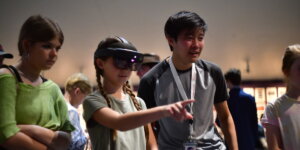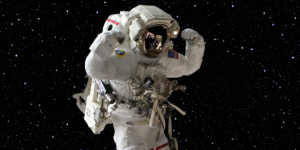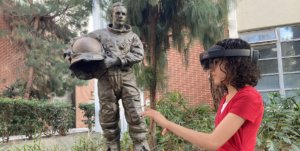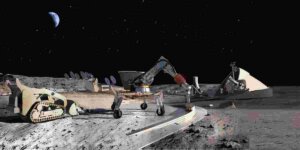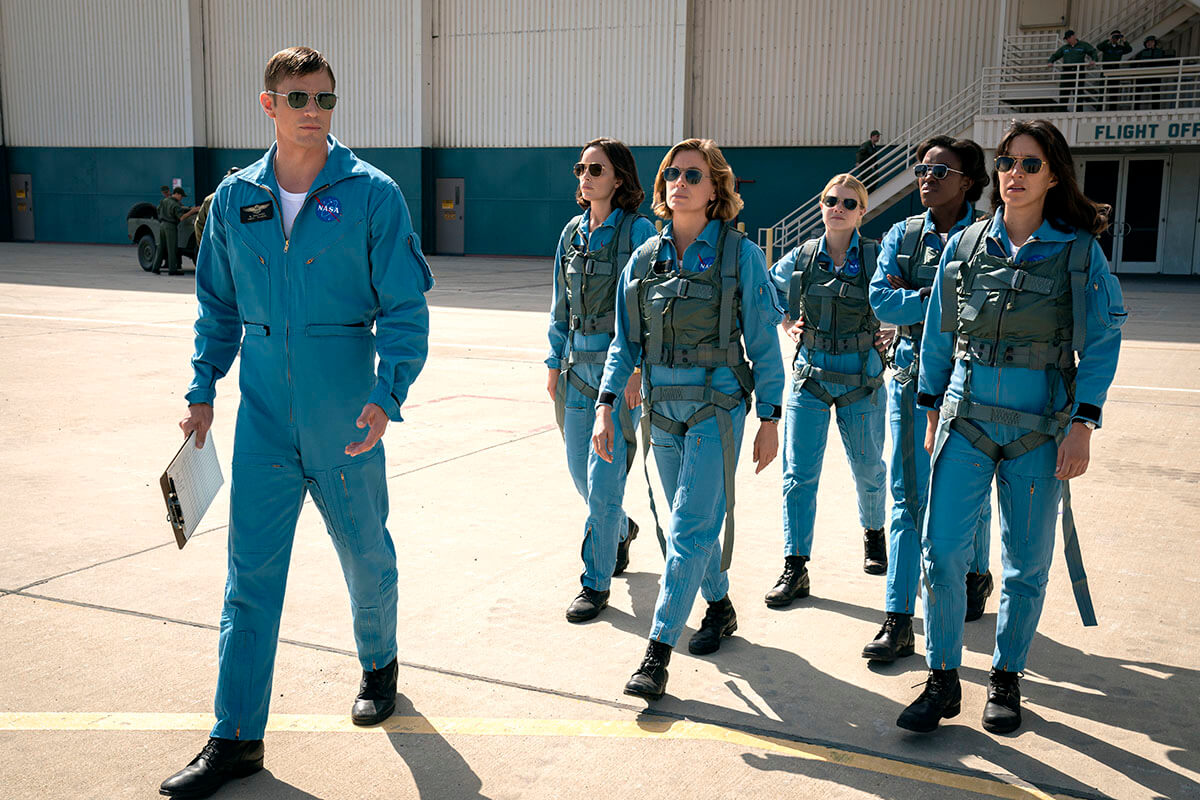
In the alternate universe of “For All Mankind,” the Nixon administration seeks to demonstrate that American women should explore space alongside men. Photo Credit: Apple TV+.
Garrett Reisman, who joined the USC Viterbi School of Engineering in June 2018, has been a NASA astronaut and director of space operations at SpaceX. But in addition to his professional and academic career, Reisman is no stranger to Hollywood, having been an advisor on several space-themed productions, including last summer’s “Ad Astra” and Apple TV+’s newly released “For All Mankind.”
Created by Ronald D. Moore (“Battlestar Galactica,” “Outlander,” “Star Trek: the Next Generation”), “For All Mankind” posits the question: “What if the global space race never ended?”
With input from Reisman, the new series explores an alternate history where the Soviets are the first to land on the moon and what this means for the future (or, in this case, the past) of human space exploration.
Here’s some insights from Reisman on the new show, which debuted on November 1, 2019.
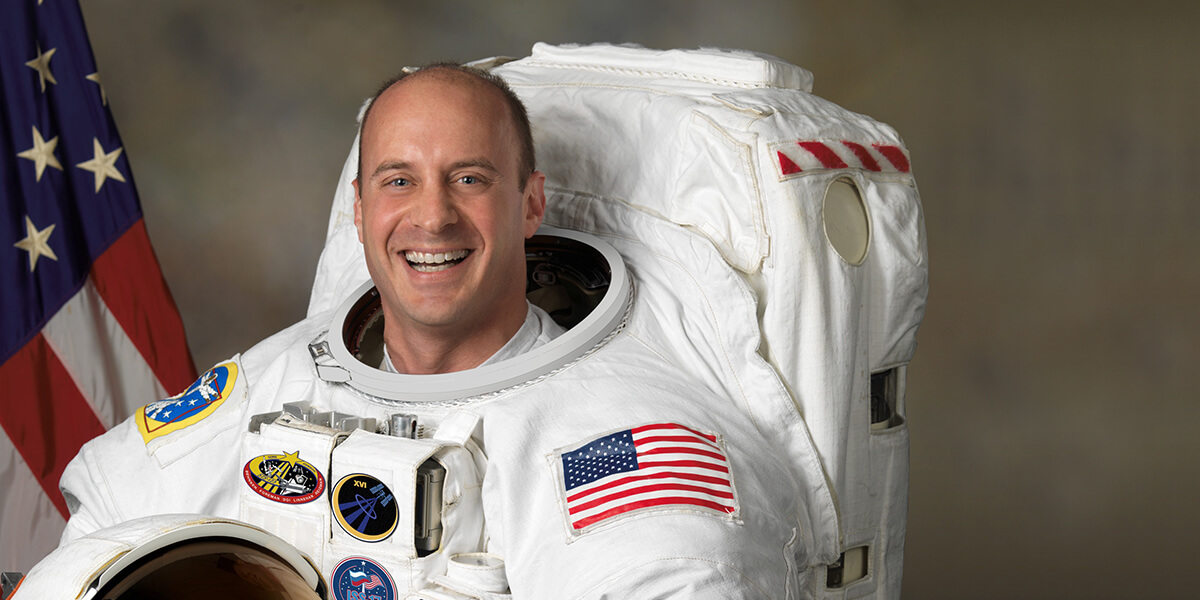
Garrett Reisman/ Photo Credit: NASA
Some of the origin story of “For All Mankind” goes back to a lunch you had with Ronald D. Moore, the show’s creator. Tell us about that lunch.
One day, I received a call from Ron Moore who said that he was thinking about a new TV show about space and wanted to pick my brain and bounce a few ideas off me.
I have tremendous respect for Ron. As a big fan of “Star Trek,” “Outlander” and “Battlestar Galactica,” I definitely consider myself a Ron Moore fanboy, so I was thrilled. He came down to SpaceX one day, and I gave him a tour of our rocket factory which was a lot of fun for both of us; and then we had lunch in the SpaceX café.
Over lunch he said that he had two ideas for the new show. One would be a period drama set at NASA in the 1970s. Kinda like a “Mad Men” but with less advertising, much wider lapels and more space stuff. I thought that sounded cool, but then he told me his other idea – an alternate history where the space race kept going at the same pace we experienced during the Apollo era. What would have been different in the world? Where would we be today? My eyes lit up, and I thought it was an amazing premise for a TV series.
I told him that the Soviets were actually much closer to attempting a moon landing than most people know. I described seeing prototype flight hardware for a lunar lander in a large dusty hall in Moscow, and I told him that Alexei Leonov, the first spacewalker, had been selected to command the mission. Only the failure of their monster N1 rocket prevented them from seriously challenging the U.S. in the race to put a man on the moon.
Soon thereafter, he pitched the alternate history version to Apple, and they liked it too.
This, of course, is not your first brush with sci-fi TV shows created by Moore. What’s the story of your brief interlude on “Battlestar Galactica?”
Yeah, being an astronaut has been very good to me! For example, there was the one day that I got to be a Colonial Marine on “Battlestar Galactica.”
Let me explain. My Expedition 16 commander, Peggy Whitson, and I are big fans of that TV show. Before a mission, the behavioral support group at NASA will offer to arrange celebrity interviews for the crew of the Space Station as a morale boost. When my turn came, instead of naming Scarlett Johansson or Steve Carell or someone like that, I asked to have a video conference with Ron Moore and David Eick, the creators and producers of “Battlestar.” When we got back to Earth, Ron was kind enough to invite us up to Vancouver to visit the set.
I got to meet some really cool people (that’s Ron Moore in the yellow shirt).
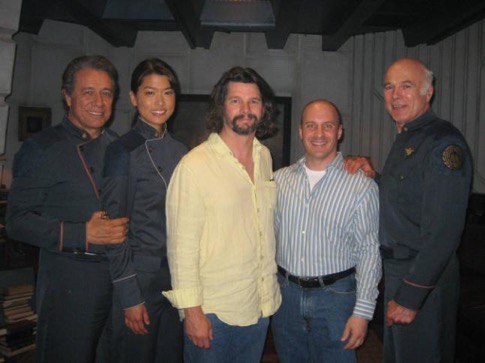
Garrett Reisman with the cast of “Battlestar Galactica” and series creator, Ronald D. Moore. Photos courtesy: Garrett Reisman.
I was having so much fun that I stayed on the set until 1 a.m. This was a bit of a problem since I had a 6 a.m. flight out of Seattle. I drove through the night, didn’t bother to check in at the hotel and just went straight to the airport. About 24 hours later, after connecting through Houston and Dallas I found myself in a bar in New York City, when it hit me suddenly – that trip used to take me about 10 minutes.
The premise of the new show is “What if the space race had never ended?” As an astronaut, how do you think your own space career might have been different had this become reality?
Well, I think I would have gone further into space than low-Earth orbit. Don’t get me wrong, flying on the shuttle and the space station was incredible, and I am very grateful for the opportunity to have those experiences along with amazing crew-mates to share them with. But walking on the moon…or Mars? I don’t want to seem greedy, but that’s got to be even better.
In fact, the desire to do more, to go further and faster is one of the main reasons why I eventually left NASA and started working at SpaceX. I’m proud of all SpaceX has accomplished, and in part due to this company’s success, other private companies and NASA itself are becoming increasingly ambitious, and I think that we as a country are on a better trajectory today with regard to furthering the cause of human spaceflight then we were just a decade ago.
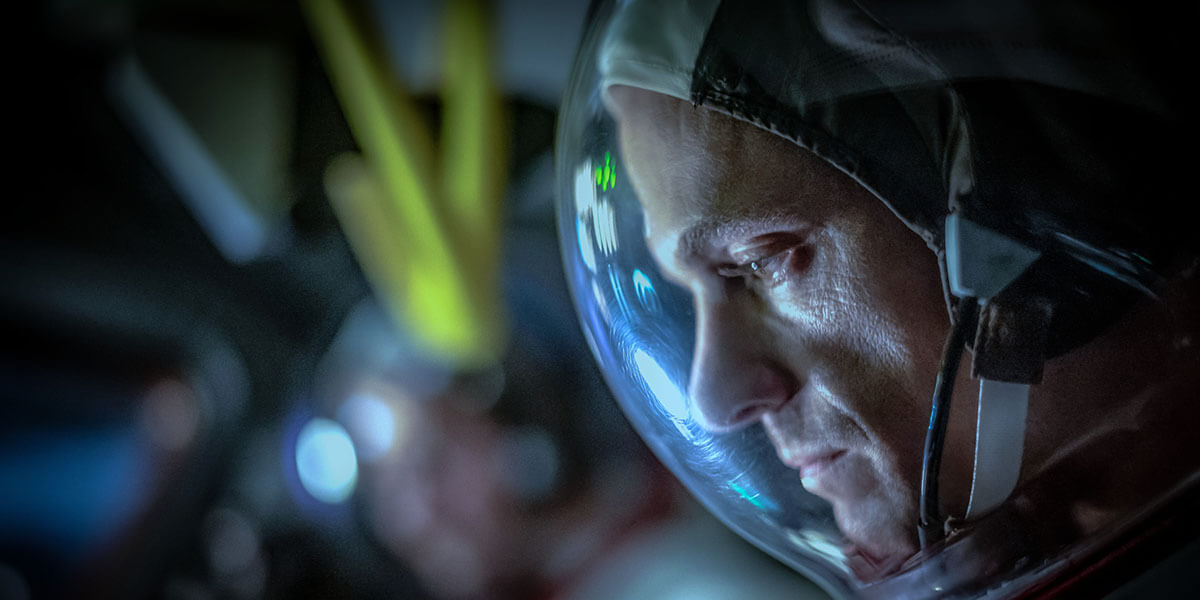
“For All Mankind” imagines a different 1969 where the Russians are the first to land on the moon. Photo Credit: Apple TV+.
Absent the geopolitical fear of the Soviet Union conquering space, what else might compel more Americans — and specifically American lawmakers — to devote significant resources for space exploration?
There’s always the chance that another space race will occur between us and China, for example, motivated by geopolitical conflict just like Apollo, but I don’t think that’s necessary. I think that all that’s required is success. If we are successful in returning to the moon, or better yet, sending astronauts to Mars, and we capture the public imagination, then perhaps we will find the political will to increase government spending on human spaceflight. Most people don’t realize that we are spending only about one half of one percent of our federal budget on NASA. We could double that and still only be spending one penny of every taxpayer dollar on this investment in our future. That shouldn’t be so hard to justify.
From the trailers, it appears that female astronauts play a much larger role in this alternate timeline. Tell us about that.
In our alternate universe, the Nixon administration feels the need to demonstrate that American women should explore space alongside men. I hope people tune-in to see the series of events to shift the history — I don’t want to spoil the moment, which is pretty great.
In reality, a number of women were selected and tested as potential astronaut candidates as part of the Lovelace Medical Clinic’s Women in Space Program in the early 1960s. This privately-funded project made a good case for including women in the U.S. space program, but unfortunately due to the times, this would not be the case until much later.
As an advisor to the show, what was the most unusual question you were asked during the creation of the show?
Hmmm…that would probably be when I was asked what women with long hair do while performing a spacewalk. Do they use a Scrunchie or a hair clip? Pony tail?
This was a difficult question for me to answer. If you know me, or even have just seen a picture of me, you know why. Fortunately, I was able to phone a friend and get the right answer to this question. Which, if you are curious, is: pony tail.
What was it like revisiting the space race given that you’ve spent significant time with Russian cosmonauts during your own training? In fact, if I recall correctly, you trained at Star City — “a secret, Cold War Soviet air force base.”
During my training for my flight on the International Space Station, I spent over two years living in Russia, and I got to learn the language and get to know the Russian people and their culture. So while “For All Mankind” is framed from the American point of view, my experiences in Russia really helped me contribute to that aspect of the show.
One particular serendipitous aspect was the fact that I got to know the real Alexi Leonov quite well along with his daughter who lived for a while in Los Angeles. Alexi was unwell during the filming of our TV show and would pass away just before it aired, but I really enjoyed telling his daughter that her father was the first man on the moon, in our show anyway, and last summer we watched the trailer together which depicted Alexi stepping on the moon. She told me that she would let her father know, and I hope that he was able to get a good chuckle out of it.
Most Americans have very little idea how reliant we are on Russia to get into outer space in 2019. What’s your prediction on when astronauts will launch from U.S. soil again?
2020. Both SpaceX and Boeing are getting very close to flying NASA astronauts on the Crew Dragon and the Starliner, respectively, under NASA’s Commercial Crew Program. We’re going to be back in business and better than ever – within months from now.
You’ve said before that it’s important not to be so stringent about the history and the science that it gets in the way of a good story. That said, is there a specific bit of scientific or historical accuracy that you lobbied strongly for?
That’s true, but everyone involved in “For All Mankind” wants to make it seem as real as possible to the viewer so that makes it really fun for me and challenging too! Fortunately, I’m not the only technical advisor on the show. Michael and Denise Okuda have been helping Ron Moore out with technical advice going back to his “Star Trek” days, and they have been very helpful on this show too.
But I did push for a few things that I thought were important. It’s hard to tell you exactly what they were, since these episodes haven’t aired yet, and I don’t want to let any spoilers slip out. But when you watch the episodes near the end of season one, check out the orbital mechanics!
Published on November 21st, 2019
Last updated on February 11th, 2021




